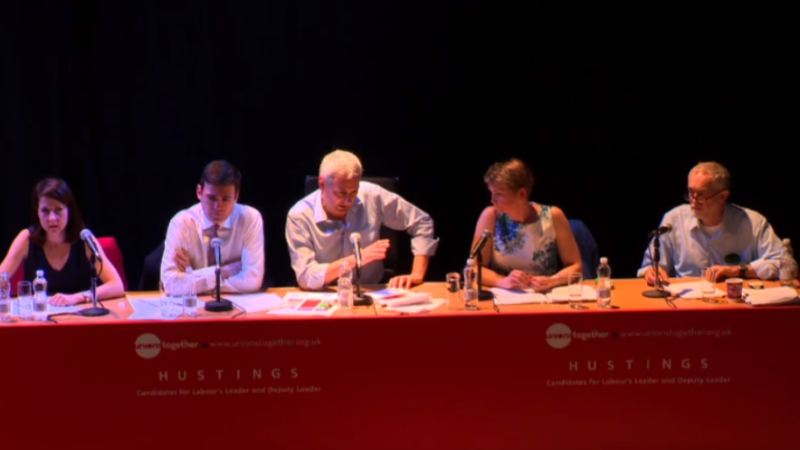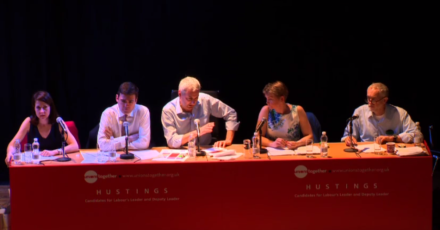

Well this current period in the internal life of the Labour Party is certainly cathartic. We appear to be playing out a collective breakdown, a bursting of the dam of decades of pent-up frustrations, all in public. Whether we will deserve any voters at the end of it is unclear.
The dialogue between the four leadership contenders at hustings is polite and reasonable.
I’ve not heard of any outbreak of uncomradliness at party meetings – in most of the country the circle of people who keep Labour functioning come wind and rain is too small for people not to have their debates in a friendly way. Who wants to lose the ward’s only other leaflet deliverer because you back different slates for the National Policy Forum?
But the layer in between are using social media to scratch each other’s eyes out.
A month ago I used this column to put the democratic case for Jeremy Corbyn to be on the ballot paper. I said I disagreed with him but he represents a legitimate strand of opinion in the Labour Party which should have the chance to vote for him. I know that Jeremy and others like him would feel reciprocally that although they don’t like some of the things I believe in they realise we belong in the same party.
But this weekend I had to put up with a torrent of online abuse from a segment of Jeremy’s grassroots fans. The most repeated allegation was that I was a “Tory” – though one individual said I was a “fascist” and “fifth columnist”. This is the same rage and incivility that characterised Tony Benn’s deputy leadership campaign against Denis Healey in 1981. Back then it was heckling and disruption at meetings by people wearing Benn badges, now we have social media trolls with Corbyn twibbons on their profiles.
Like Benn, Corbyn is personally civil. But the millennial feel to his politics – the impossibilist fantasies he offers – seem to excite a degree of fanaticism and anger that is not compatible with normal standards of discourse between fellow members of a democratic political party.
The anger seems primarily aimed not at the Tories, but at the allegedly treacherous moderate wing of the Labour Party. If I am a “fascist” or a “Tory”, what does that make real Tories? And it does not discriminate much. I’m a Blairite apparently. This would be news to Liz Kendall’s campaign team. And Ed Miliband was a Blairite too according to the Twitter mob. The truth is no one in the Labour Party is a Tory, we are all motivated by the same belief in social justice, and if anyone wanted to be a Tory they would just join the Tory party, not hang around trying to save Labour when we have just badly lost two elections.
My crime was to have sent an email to the mailing list of Labour First, which someone then shared with the media. For the uninitiated, Labour First has been around since 1988, and is the trade union-oriented, pre-New Labour bit of Labour’s moderate wing.
This is what I wrote:
“There are prominent supporters of Labour First backing each of Andy Burnham, Yvette Cooper and Liz Kendall. We clearly do not share Jeremy Corbyn’s politics and believe these would destroy Labour’s chances of electability. We would therefore encourage supporters of Andy, Yvette and Liz to transfer votes to each other at CLP nomination meetings so that as few CLPs as possible make supporting nominations for Jeremy.”
I’m struggling to work out what the problem is with this. I’m not from the leftwing of the Labour Party. I’m advising other people who are not from the leftwing of the Labour Party, and have joined an email list because that’s how they identify, to use all their preference votes in an election where the voting system is preferential. For suggesting this I’ve been accused of vote-rigging, of stitch-ups etc, etc.
I’m fairly sure the equivalent email from the Labour Representation Committee or the Campaign for Labour Party Democracy says go along to meetings and try to get Jeremy nominated, but if he gets knocked out, transfer to the next most leftwing candidate.
That’s how Labour’s internal democracy works – transferable voting not First Past the Post.
And given Corbyn does not – at least I hope does not – represent the views of 50% of party members and supporters – it’s why he won’t win the leadership. Assuming that the current virus of sectarianism doesn’t mean people on the right of the party refuse to transfer to each other out of spite. Which was kind of the point of me sending the email. No stitch-up, just an appeal to people in three campaigns to recognise they have more in common with each other than with the fourth one.
Perhaps the problem was me saying “We clearly do not share Jeremy Corbyn’s politics and believe these would destroy Labour’s chances of electability.” The first part of the sentence is just true – we don’t agree with him on many policies, though we all share the same values of equality and social justice or we wouldn’t be in the Labour Party.
And would he destroy Labour’s chances of electability? I think so. The public thought Labour under Ed Miliband was naive, idealistic and not likely to be economically competent. My hunch is that an even more idealistic, less rooted in hard economic choices approach would reduce our vote substantially not add people to it.
This isn’t about being like the Tories. It’s about having some understanding, empathy and desire to get the votes back of people who happily voted Labour in three and sometimes four General Elections and then went Tory in 2010 or 2015. These people are not Tories, they are just ordinary voters who may even identify with Labour but the Tories have persuaded we are don’t care about them or have anything to offer them, and would probably screw up the economy and make them worse off.
I don’t think Jeremy cares about these people or wants their votes.
It’s not about moving Labour down a series of notches towards where the Tories are, it’s about broadening Labour’s appeal towards the places on the spectrum where the people who should be voting Labour but haven’t been are. It’s about being able to connect with and win the trust of the pragmatic median voter who wants the best for their family just as much as the ideological voters who are turned on by our ideology. I simply don’t think Jeremy can do that.
When I heard him hust at the Local Government Association conference – and he repeats this on his website – he talked about turning Labour into a “social movement” to fight austerity. And then as an afterthought added “we might get lucky and win power”. It’s like the other three are running to be the prospective prime minister and Jeremy is running to be life president of the People’s Assembly Against Austerity. I think he would probably do a good job running a social movement, but he simply won’t be taken seriously as a prospective PM.
The focus on fighting austerity is admirable based on a narrative of economic despair that just isn’t how most of the electorate feel about the country. The Tories have been clever. There are simply not enough people hurt by the cuts to win an election. They’ve cynically targeted cuts at the people who already voted Labour – the young, the poorest, people who live in solidly Labour local authorities, whilst protecting groups of voters who might switch and have a high propensity to turnout, such as the elderly. Many voters are either unaffected or welcome the Tories taking an axe to what they saw as profligate use of public money. This is not Greece, either in the misery endured or the political response.
We need to fight to protect the victims of austerity but unless we promote a message of economic competence and offer attractive policies to people who are not affected by it, we will remain out of power and able to do nothing to reverse the cuts.
Jeremy’s chances of getting a good result have sadly been boosted by Harriet Harman’s bizarre intervention about backing the Tories on child tax credits. Of the many areas where voters want us to get real, not least welfare reform, I really doubt they want us to join the Tories in penalising people in work who happen to have more than two kids.
This has played into the narrative believed by Jeremy’s social media fan club that Labour’s moderates are Tory fifth columnists and that the leadership election is a straight fight between one candidate who embodies socialist values and three who do not.
The challenge for the remainder of the campaign is to demonstrate to Labour’s members and supporters, and to the voters we need to win over to win in 2020 that we have a vision for Britain’s future that is shaped by our socialist values but is realistic and achievable and offers the whole country, not just our core constituencies of support, economic and social advances that are worth them taking the risk of changing government.
If the choice really only is Jeremy’s vision of Labour as a perpetual angry demo against austerity, versus rolling over and accepting Tory cuts to and rollback of the brilliant policies we brought in after 1997, we are finished. I do not accept that Labour’s choices are so limited.




More from LabourList
Economic stability for an uncertain world: Spring Statement 2026
‘Biggest investment programme in our history’: Welsh Labour commit to NHS revamp if successful in Senedd elections
James Frith and Sharon Hodgson promoted as government ministers